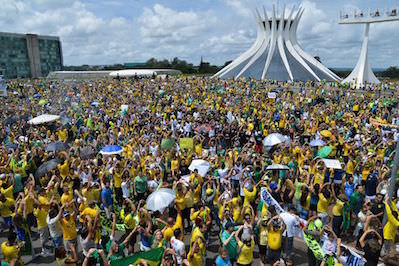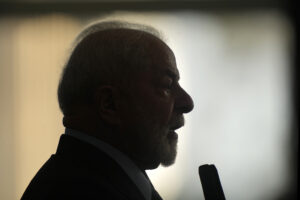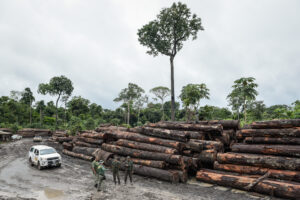‘Information War’ Fuels Political Crisis in Brazil
With a fragile democracy in upheaval, news is primarily coming from a right-leaning media monolith and social media, which tends to reinforce rather than expose biases. A demonstration in Brazil outside the Cathedral of Brasília. (Agência Brasil / CC BY-SA 3.0 br, via Wikimedia)
A demonstration in Brazil outside the Cathedral of Brasília. (Agência Brasil / CC BY-SA 3.0 br, via Wikimedia)
Impeachment proceedings against President Dilma Rousseff have divided Brazilians. Some view impeachment as illegal and question media coverage of the events. Meanwhile, the Petrobras corruption scandal, brought to light in a massive investigation called Operação Lava Jato (Operation Car Wash) looms over Brazil, a nation already struggling to come out of a deep recession.
Rapidly unfolding events have polarized the country and motivated large protests and demonstrations. Last week, 1 million people took to the streets in São Paulo to demand the removal of Rousseff, and similar protests were held in other parts of Brazil. On Friday, thousands of people across the nation rallied in support of the government, calling the impeachment effort a coup.
On March 4, federal police detained former President Luiz Inácio Lula da Silva and questioned him regarding his role in the corruption scandals racking the country. Rousseff later appointed Lula to her Cabinet, even after Sérgio Moro, the lead prosecutor in Operation Car Wash, released recorded conversations between Rousseff and Lula that seemed to suggest that the president was appointing Lula in order to grant him legal protection. Government officials and legal experts maintain that the conversations were recorded illegally and taken out of context. Nonetheless, Supreme Court Justice Gilmar Mendes blocked Lula’s appointment, a decision the government will appeal. A vote on Rousseff´s impeachment is set for April.
Coverage of the Brazilian crisis in the Western media has tended to focus on uprisings against the government, offering a reductive and inaccurate representation of events, as a recent article in The Intercept observes. The Intercept is one of few English-language publications offering fuller context. The article’s authors note that a military regime was in power in Brazil between 1964 and 1985 and that Brazilians who oppose the impeachment of Rousseff recognize that Brazil´s democracy is still fragile and find the move to oust the president reminiscent of the 1964 coup. This sector of the population does not support the current government or deny that it is corrupt. These people feel that the motivations for the attacks on Rousseff´s administration are political rather than ethical. They also question the legality of impeachment in this case.
“There is currently no legal basis for the impeachment of the president,” said Eyleen Oliveira Marenco, a prosecutor for the state of Rio de Janeiro. “It is a purely political maneuver rather than a judicial question. I must emphasize that no legal charges have been filed against [Rousseff].”
Journalist Mônica Horta Azeredo argued that “impeachment” is an incorrect term—that the attempt to remove Rousseff is in fact a coup.
Anthropologist and editor Felipe Lindoso agreed via email that the effort to impeach Rousseff is a political move: “If [Rousseff’s] government is ousted—which could unfortunately happen—it will not be for the government’s defects (which it obviously has, though these are political and not ethical), but rather for its virtues: continuing the process of social inclusion, defending the large petroleum reserves against multinational companies (with the goal of using royalties for education and social programs) … advances in income equality, reduction of poverty, increase in resources for education (new universities and technical schools, greater access to public universities, etc.), agrarian reform and greater independence in relations with other countries.”
Marenco, Azeredo, Lindoso and many others who oppose impeachment are critical of the media coverage in Brazil. They accuse dominant media outlets of fanning the flames of the country’s discontent in order to push for Rousseff’s impeachment. The principal target of these criticisms is Globo, the largest media company in Latin America. Globo, which is controlled by right-leaning interests, has long been criticized for interfering in Brazilian politics and serving as a mouthpiece for the military dictatorship, a role for which the organization later apologized. Critics of Globo, however, maintain that the network, which has 91 million viewers a day and has a near monopoly on the media in Brazil, has continued to meddle in politics.
“The Brazilian media is monopolized by the right,” said Marenco, who believes mainstream media outlets distort the truth and select stories based on their own political agenda. In order to destabilize the country and therefore advocate for Rousseff’s removal, they emphasize, for example, the economic crisis while failing to mention any of the government’s achievements. “The left has no voice in mainstream media,” she maintained.
Brazilians who favor impeachment have a more positive view of the mainstream media and Globo’s coverage. Take Daniel Jerozolimski, a systems analyst who lives in the state of São Paulo and thinks impeachment is necessary. “In my opinion,” he said, “in a democracy impeachment should be the last resort. … However, the level of crimes of corruption committed by our current government and their attempts to use privileged forums to protect criminals is becoming more and more evident. I consider the economic and political situation in the country to be very serious, especially considering that we still have three years of this administration left before the next election. The only way to stop this crisis from lasting all that time is, in my opinion, the process of impeachment. I’m therefore in favor of it, as long as it follows constitutional law.”
Jerozolimski contends that official media coverage is adequate and that many unofficial outlets—both on the left and the right—invent false news stories to confuse the population. “I see many uninformed people who believe that they are sharing real news, when in reality they are spreading false information,” he said in referring to the large amount of false news that circulates in Brazil, particularly via social media.
In 2013, Forbes reported that 78 million people in Brazil use social media, a number that has only grown since. This large-scale access to the Internet, combined with a shoddy education system and high rates of functional illiteracy (27 percent of adults between the ages of 15 and 64 have only rudimentary reading and writing skills), facilitates the circulation of rumors. False or manipulated news abounds on the right and the left, and social media, with its visual appeal and ability to circulate news quickly with no editing controls, has contributed to increasing the amount of tension in the country.
Social media can give voice to the left. In Brazil, even the poorest classes have cellphones and access to the Internet, reports Maria do Carmo de Oliveira, a professor of Brazilian literature. Referring to the ideas of political theorist Hannah Arendt, she notes that social media “can create spaces of action and intervention, establishing dialogue and reflection.”
In reality, however, social media reinforces, rather than challenges, users’ ideological leanings. Links and comments that appear in news feeds correspond to users’ pre-existing beliefs. In the midst of the country’s political crisis, Brazilian journalist and professor Gil Giardelli warned social media users of the effects of ideological “tunnel vision.”
The current political battles in Brazil are being fought, in part, online. One journalist referred to the crisis as “a total information war.” As events continue to unfold, the media—both official and unofficial channels—will continue to play an important role in the country’s uncertain future.
Your support matters…Independent journalism is under threat and overshadowed by heavily funded mainstream media.
You can help level the playing field. Become a member.
Your tax-deductible contribution keeps us digging beneath the headlines to give you thought-provoking, investigative reporting and analysis that unearths what's really happening- without compromise.
Give today to support our courageous, independent journalists.






You need to be a supporter to comment.
There are currently no responses to this article.
Be the first to respond.